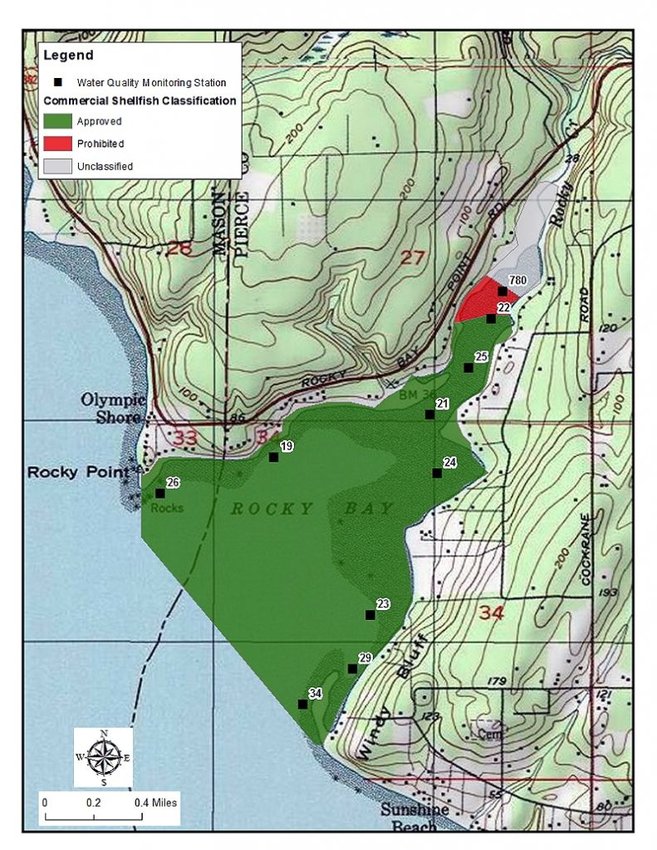 Current Rocky Bay shellfish closures. Courtesy Washington State Department of Health
Current Rocky Bay shellfish closures. Courtesy Washington State Department of Health
Routine testing last winter at the head of Rocky Bay revealed a concerning level of coliform bacteria to the Washington State Department of Health (WSDOH). Eight and one-half acres were closed to shellfish harvesting until further testing could be performed. When that testing showed persistently high numbers, the bay conditions were downgraded from approved to closed. The Rocky Bay Closure Response Plan, initially written in 1996, was updated as a result and residents were notified. The downgrade and the draft of the updated plan were discussed at a public meeting June 22. Nearly 30 residents attended, along with representatives from Pierce County and the shellfish industry. WSDOH routinely tests water safety at all sites where shellfish is harvested recreationally or commercially, though testing is more frequent in the commercial areas. Water is tested for naturally occurring biotoxins and vibrio parahaemolyticus, as well as for coliforms associated with human and animal waste. According to Jean Snyder of WSDOH, in 1996, Rocky Bay’s water was downgraded and the Rocky Bay Shellfish Protection District was formed. The water improved over the next five years and the bay was listed as approved in 2001. Testing since then showed slowly increasing coliform. Levels had risen significantly by 2014. By last fall, the levels at the head of the bay precluded shellfish harvesting. With that closure, the state called in Pierce County to help with planning to address the problem. The Tacoma-Pierce County Health Department (TPCHD), the Pierce Conservation District, the Department of Ecology and the Department of Surface Water Management are all involved with planning and implementation. Ray Hanowell of the TPCHD said that property owners in the watershed were identified using a county mapping system. Mailing addresses were obtained through tax assessor records, with the goal of reaching all those who own property with buildings. The draft plan focused on identification, prevention and correction of sources of contamination. The possible sources are humans, pets, livestock and wild animals such as Canada geese and raccoons. Hanowell acknowledged that, at this point, the sources of the coliform contamination are not certain. Environmental Compliance Manager Erin Ewald of Taylor Shellfish attended the meeting. She previously worked for Kitsap and Pierce conservation districts. Taylor Shellfish and Minterbrook Oyster Co. both harvest clams and oysters on Rocky Bay from beaches that are not contaminated, but they are concerned for the overall safety of the water. "Shellfish is just the canary in the coal mine. The real issue with water quality is human health. Taylor wants to be a part of any community effort to keep our water clean and safe," she said. Cindy Mullins, a resident who attended the meeting, said, "Residents were very concerned that one of the main steps in the plan was for regular inspections and maintenance of septic systems at considerable personal expense, when it is not at all clear that failing septic systems are the problem. They wanted more information and more time to review and make recommendations on the plan." The county provides financial assistance for septic system evaluations and repairs, but repairs can still present a financial hardship for those with limited incomes, Mullins noted. She was also concerned that a county plan for regular inspections was a one-size-fits-all approach. "It doesn’t make sense to have the same schedule for a weekend or summer home, a home with just one or two and a home with a large family," she said. Some residents at the meeting brought up the presence of homeless camps in the watershed area. Pet waste is also a problem. Hanowell noted that septic systems are not good at handling pet waste and that it should be bagged and disposed of with the garbage. Because there were so many comments and concerns, there will be an additional 90 days (until Sept. 20) for community input. Feedback is encouraged concerning prioritization, the usefulness of the proposed actions, and any additional proposals. A water-quality team of county and community representatives meets quarterly in the Whitmore Room at the Key Peninsula Civic Center.
UNDERWRITTEN BY THE FUND FOR NONPROFIT NEWS (NEWSMATCH) AT THE MIAMI FOUNDATION, THE ANGEL GUILD, ADVERTISERS, DONORS AND PEOPLE WHO SUPPORT INDEPENDENT, NONPROFIT LOCAL NEWS